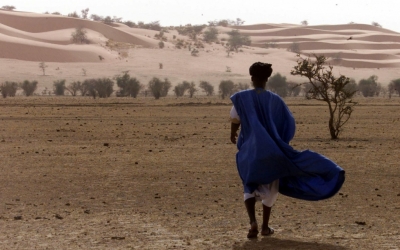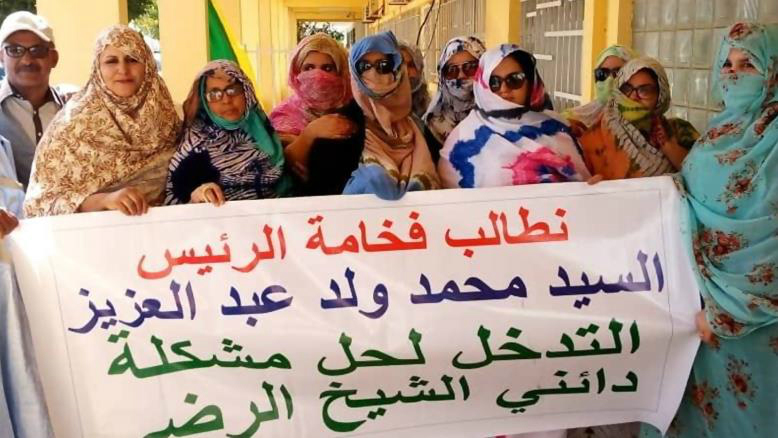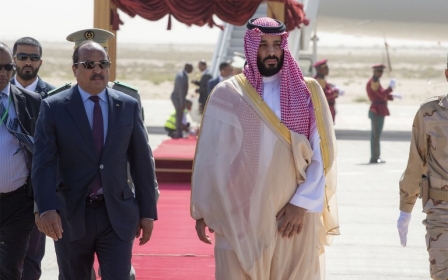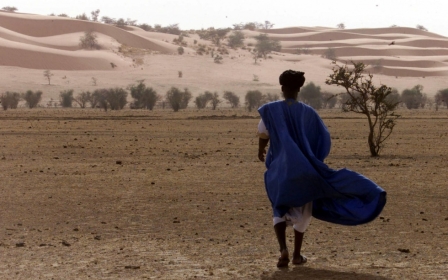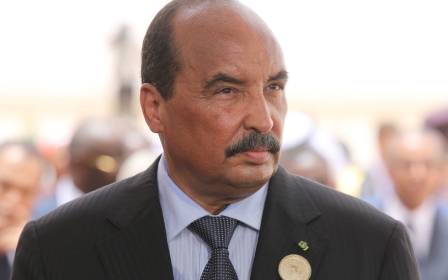Mauritania activist arrested after exposing president's son's ties to property scam
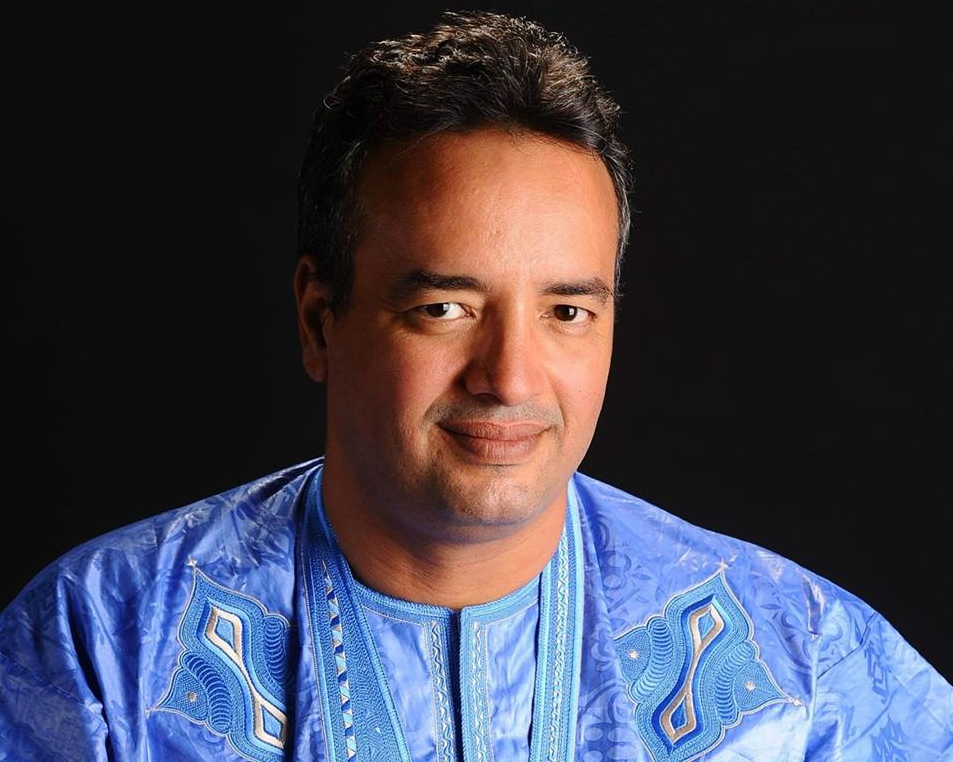
Days after detaining a human rights and transparency advocate, Mauritanian police raided his home and seized his computer late on Monday, according to his brother.
Prominent Mauritanian activist Abderrahmane Weddady was arrested on Friday for his role in exposing an alleged scam orchestrated by a prominent religious scholar linked to the president's late son, in which thousands of families lost their homes.
Weddady, who is also a businessman and widely followed on social media, first exposed the scheme in January 2016, but last month he uncovered documents which he said directly implicate the family of Mauritania's President Mohamed Ould Abdelaziz, posting them on his Facebook page.
Nasser Weddady, Abderrahmane's brother, who is also an activist, told Middle East Eye that Weddady was "a consistent opponent of the regime, on the grounds of corruption and abuse of human rights".
"He is one of the most vocal critics of the president with a long history of activism... he became one of the most popular Facebook users in the country," Nasser said. "He served as an opinion leader."
Mauritania's government has long been accused of corruption. According to the Mauritania corruption report, all sectors of the economy suffer from pervasive corruption, as well as the judicial system. Almost 50 percent of all companies in the country consider the courts to be a constraint to business and many feel that they lack independence, and the system relies heavily on bribery for favourable outcomes.
'They were just locked up. This was clearly punitive and politically motivated.'
- Nasser Weddady, brother of imprisoned activist Abderrahmane Wedaddy
According to Nasser, Weddady's attention was first brought to the alleged scam when stories emerged of a man offering to buy people's property for more than market price, only to then pay them a portion of the amount upfront and fail to pay the remainder.
Sensing something unusual about the stories, Weddady did some digging, discovering that this mysterious property procurement had been going on for a number of years, leading him to first "blow the whistle" on what he thought resembled a "Ponzi scheme" in January 2016. According to Weddady's findings, Egyptian religious scholar Ali al-Rada was implicated at the heart of the scheme.
Earlier this month, Mauritania's economic crimes unit called Weddady in for questioning, with fellow blogger Shaikh Ould Jiddou.
According to his brother, Weddady repeated to the unit what he had previously said publicly and expressed hopes that the president and Rada would be investigated.
Both Weddady and Ould Jiddou were released and informed that they remained under investigation - only to be placed under arrest on Friday.
Weddady was prevented from accessing his lawyer for over eight hours after his arrest, Nasser told MEE, adding that once his lawyer was allowed to see him they were given only a few minutes together.
"They were not told of their charges," Nasser said. "They were just locked up. This was clearly punitive and politically motivated."
Nasser wrote from his brother's social media account on Monday to report that police forces had since raided Weddady's home.
A far-reaching 'scam'
Weddady has alleged that Rada would pose as a buyer and send his representatives to convince people to sell their property at an inflated price in the small village of Taysir, around ten kilometres north of the capital Nouakchott.
Mohamed Ould Omar al-Aujifti, a resident affected by the ruse, told Al Jazeera last week that Rada's representatives offered to buy his house for over double its worth.
When he asked why they offered so much for the property, they told him that the man they represent, Rada, was a good and trusted man who wants to do good for the people.
"The sheikh has representatives and they go as teams, reach out to people and offer them deals," Nasser told MEE.
"They say Sheikh Rada is willing to pay more than it's worth and they sell him as a blessed man."
Like Aujifti, around 9,000 others are reported to have lost property, land and wealth to the scheme.
The alleged victims trusted that Rada was a man of his word and accepted part of the payment only to be left waiting for him to pay his debt to them on the promised date.
Aujifti left his home and moved into his parents' house with his wife two years ago, hoping to buy a new home once he got the rest of the payment. However, when the date of the I owe you came and went last year, he joined the thousands of others who had been tricked by Rada and his representatives.
Once the exchange was made, it is alleged that Rada would sell the house for cash for a much lower price and never pay off the debt to the initial seller.
Neither the Mauritanian embassy in the UK nor a representative for Rada could be reached for comment by MEE by the time of publication.
Links to the president's son
When Weddady first discovered what was happening in Taysir, and decided to expose the scam, it had already been ongoing for a number of years.
According to Nasser, despite calls from residents and the attention brought to the scheme by Weddady in 2016, "the state at no point intervened" to stop it.
But Nasser said everything changed when Weddady got his hands on sales receipts in the name of Ahmed Ould Abdelaziz - the son of Mauritania's president, who was killed in a car accident in late 2015.
It was then, according to Nasser, that Weddady faced pressure to stop talking about the issue.
On 25 February, Weddady posted photographs of the sales receipts of land and other property sold to Ahmed Ould Abdelaziz on his Facebook page, with the name of the president's son highlighted on the 30 images.
"Over three years ago, I wrote that [President Mohamed] Ould Abdelaziz is benefitting from Sheikh Rada's operation, and some called me prejudiced against the president, and bitterly opposed to him, making up stories," he wrote.
"These documents prove what I have been saying, and they are a small portion of the wealth he has taken from the poor and needy," Weddady added in his post.
Nasser told MEE that prior to his arrest, his brother had been approached by the government using both intimidation tactics and the prospect of bribes in an attempt to silence him.
In a column for the Arab Tyrant Manual - an independent website focused on human rights and authoritarianism - Nasser wrote: "The charlatan behind this Ponzi scheme remains free and under state protection after robbing the entire country, whilst my brother, who blew the whistle, has been arrested, charged and will potentially be put on trial. How did this happen?"
Middle East Eye propose une couverture et une analyse indépendantes et incomparables du Moyen-Orient, de l’Afrique du Nord et d’autres régions du monde. Pour en savoir plus sur la reprise de ce contenu et les frais qui s’appliquent, veuillez remplir ce formulaire [en anglais]. Pour en savoir plus sur MEE, cliquez ici [en anglais].


